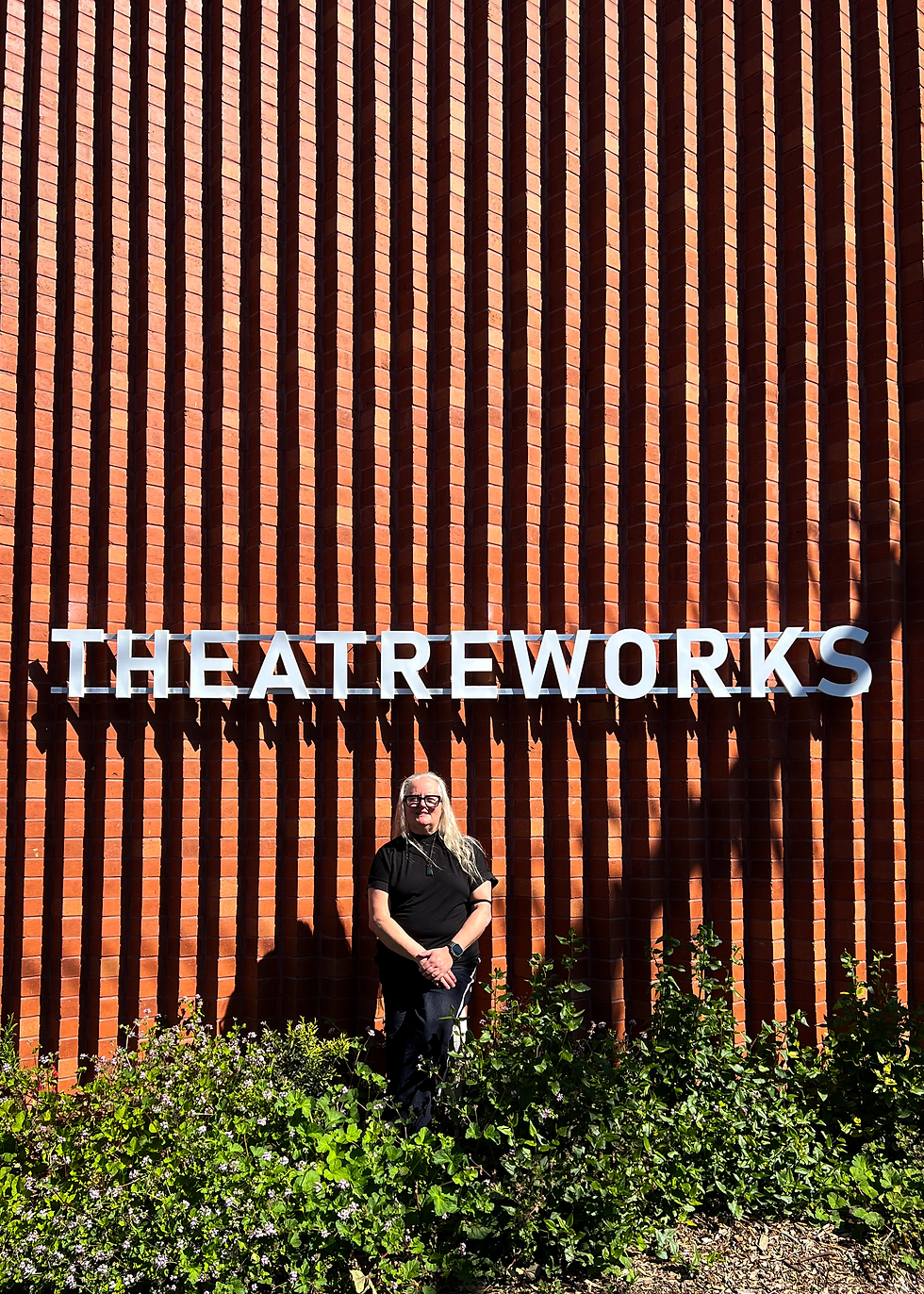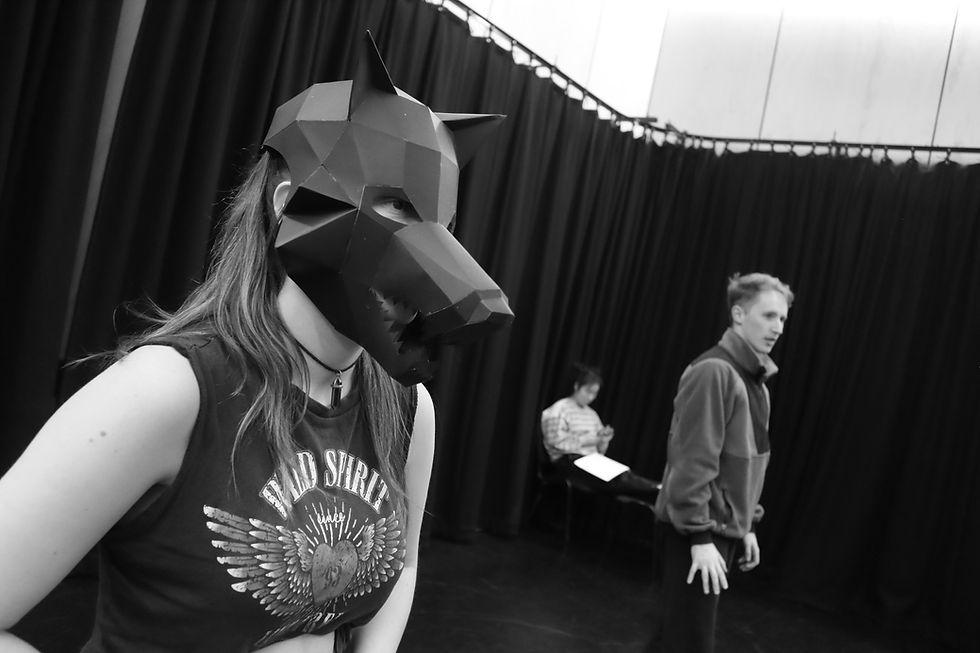In Conversation with Harry, Delta & Rebekah
- TW
- Aug 8, 2023
- 6 min read
Co-created by Rebekah Carton and Delta Brooks, in collaboration with the visionary Harry Haynes, "Cygnets" takes centre stage as a cross-disciplinary and expressive art piece, pushing the parameters of witnessed performance and blurring the lines between theatre and performance installation. We catch up with the trio to FInd out more on what audiences can expect.

Harry Haynes
Q: Where did the idea behind Cygnets come from?
A: Rebekah and Delta came to me 2 years ago with an idea of exploring an encounter between Helen and Clytemnestra waiting to cross over to the afterlife. We spoke in depth about the established mythology of these two women and about their own lives and passions. I was deeply moved by their love for these characters and each other. I’ve always been haunted by the power of family and shared memory. Who has claim over what really happened? Then there is the myth of Helen and Clytemnestra’s mother Leda who was raped by Zeus, who had taken the form of a swan, which was so disturbing to me. Yet we have all this renaissance art and late romantic poetry that portrays it as high art. So there was a tension there which kept drawing me in.
Q: What was the impetus to have three writers collaborate on this work?
A: I think our approach was a process of writing on top of the material that was being born from the room. The plays development had a beautiful and slow gestational period over many months. Every week we would meet, chat and I would watch Rebekah and Deltas improvisations. We would all go away at the end of the day to write and then bring that material back into the room the following week. The work that came out of this process is extremely personal in many ways and shared authorship was the perfect way to honour that.
Q: What are some key themes explored in Cygnets that are relevant to today?
A: I’ve been sitting in rehearsal this week with the question: can you ever truly know your family? This theme of familial knowing (or unknowing) feels extremely relevant when we see people derided in the public eye.
Q:What have you most enjoyed about the development and rehearsal period so far?
A: Being in a room with all my collaborators who are an endless source of inspiration and who have such conviction and love for this medium!
Q: What kind of conversations do you hope Cygnets would ignite amongst audiences post-show? A: I’ve hope people can come away from the work in state of uncertainty and confusion (in a positive sense!) and from that place leave with an express desire to explore meaning making with others. I hope it can draw out something within an audience that they have to language passionately or better yet take onto a dance floor!
Delta Brooks
Q: Where did the idea behind Cygnets come from?
A: Cygnets came from a strong desire for Rebekah and I to work on something together, the two of us closely on something we could really sink our teeth into and stretch ourselves as performers. We hunted for a two hander for women, but we couldn’t find anything that lit a fire in us. Then Rebekah came to me with a bottle of red wine and an idea: Clytemnestra of Sparta, Helen of Troy - twins sisters. While their brothers Castor and Pollux have a beautiful story linking them, ultimately forming the Gemini constellation (Rebekah and Myself are also both geminis) but the fact that the women are also twins is often untold in classical versions of their story and they are never seen interacting together - could we fill in the blanks and give these two women who have epic journeys in their own rites… a shared story.
Q: What was the impetus to have three writers collaborate on this work?
A: Rebekah had worked with Harry and the Liminal space and sung their praises - I had the joy of being in the audience to witness their work together and both Rebekah and I knew that Harry was the right person to collaborate on this project and help us bring it life. He champions and understands the voices we have crafted for these women and creates a magical world for them to exist in.
Q: What are some key themes explored in Cygnets that are relevant to today?
A: Cygnets touches on the cycle of intergenerational trauma. The inherited experience of being a women, in relationship to men, our sisters, our mothers and ourselves. The lenses through which women are viewed and have been from the classical world and through to our contemporary media.
Q: What have you most enjoyed about the development and rehearsal period so far?
A: Harry and the Liminal space have fostered a space in which we can make work with a thrilling sense of play. It’s an incredibly safe, open and collaborative process that is very freeing as both a performer and writer. It’s a great pleasure to spar with and be invigorated by Rebekah’s work, it’s thrilling to get in the ring with her and see where we end up at the end.
Q: What kind of conversations do you hope Cygnets would ignite amongst audiences post-show?
A: I hope audiences are provoked to reflect on their relationship to the women in their lives and the stories that have been formed around them. The ways in which society creates narratives around women - who tells their story and how to we partake in conversations around them.
Rebekah Carton
Q: Where did the idea behind Cygnets come from?
A: It started with the search for a two-hander. Delta and I had long wanted to work together and were pretty uninspired by the choices. We both have a background in theatre-making and were keen to create something, so I suggested devising a work around Castor and Polydeuces, the Gemini twins. and it was while I was reading into these brothers that I realized that Clytemnestra and Helen were their twin sisters. and unlike their brothers, who are practically inseparable - these women are not depicted together anywhere. Not in art, literature, history, mythology. And I couldn't let that go. Delta and I desperately wanted to give these women some kind of history- and a chance to be seen together as well as apart. what might happen if we allowed these two formidable women to share the stage?"
Q: What was the impetus to have three writers collaborate on this work?
A: I feel like it kind of evolved organically. I had worked with Harry before and found his method of re-examining text deliciously challenging and incredibly detailed, so we knew we wanted to approach him quite early on. Harry came into the Cygnets development with a passion for these stories that we could not have anticipated. I suppose through this mutual love for these women and their history, our storytelling became a natural, shared experience.
Q: What are some key themes explored in Cygnets that are relevant to today?
A: One of the main themes that Cygnets explores is the male gaze and the way that women throughout history are viewed through particular lenses. These two women have only really had their stories written by men, told by men, and performed to men. Outrageous.
Q: What have you most enjoyed about the development and rehearsal period so far?
A: I get to wake up every morning and work with some of my closest friends, but more importantly, I get to develop work that I am passionate about with a group of creatives that I admire, respect and am constantly challenged by.
Q: What kind of conversations do you hope Cygnets would ignite amongst audiences post-show?
A: We want Cygnets to provoke people to question where they look and what they see - not only in the show but in everyday life. We hope audiences will examine these characters through the many different lenses this production offers - both literally and figuratively.
I think that we forget that they must have existed outside of Greek Tragedy. They are more than just villains - they are three dimensional human beings, capable of more than just starting wars and murdering husbands. They love, they grieve, they live. CYGNETS by the liminal space
16-26 August | Explosives Factory BOOK TICKETS





Comments